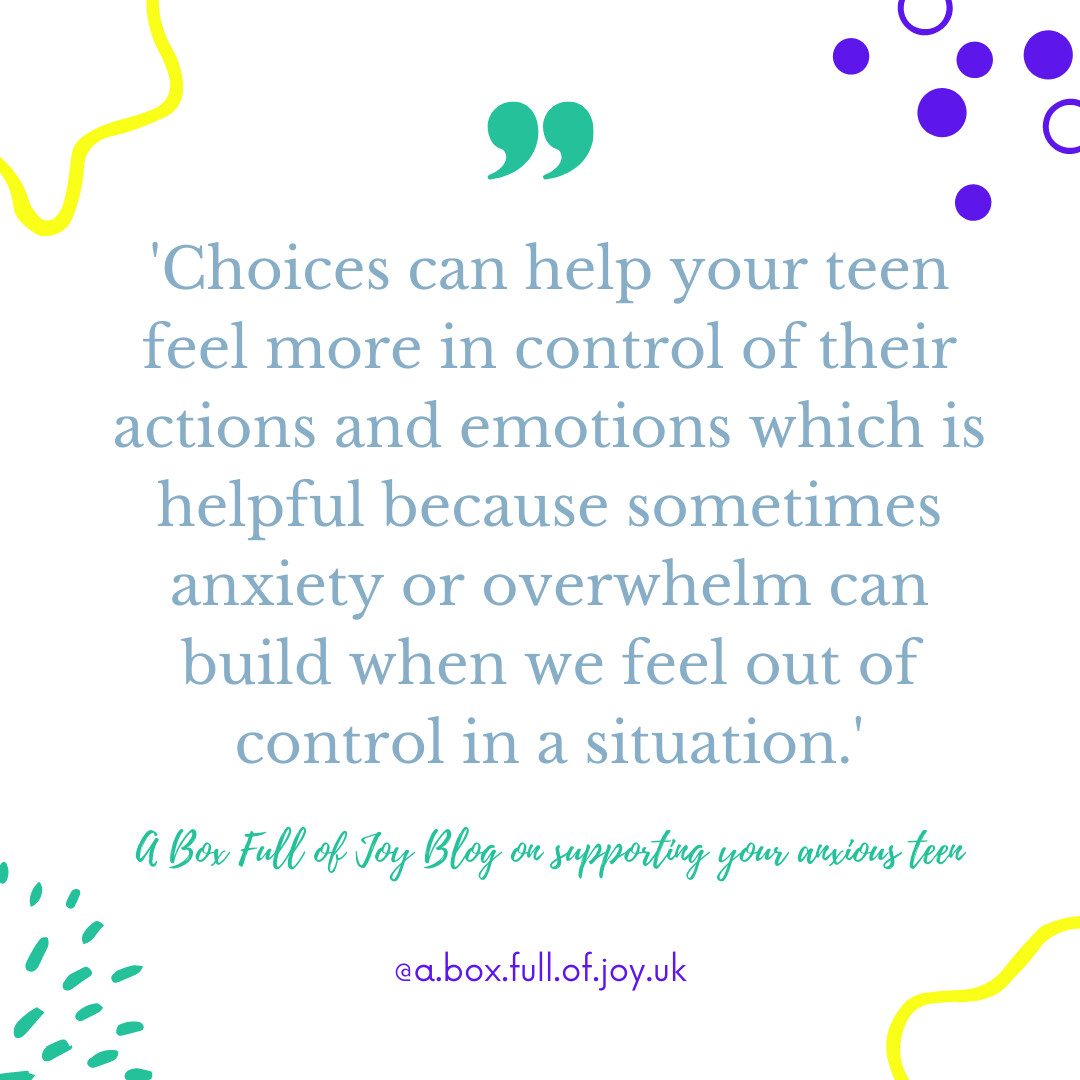
It's inevitable that change will come into our lives (think the Christmas holidays coming up, the nativities, the additional ‘fun’ lessons at school). For children, change can be especially difficult to cope with, even change that we may see as small can be the difference between them feeling safe and secure in their day to day lives to feeling scared and anxious. As a parent, it's important to be there for your child and help them through this tough time. In this blog post, we will discuss some tips that can help make the transition easier for both you and your child and I will share some things that have helped my autistic son especially.
One of the best things you can do as a parent is to be there for your child. Talk to them about the change that is coming and allow them to express their feelings. It's also important to reassure your child that you will still be there for them, no matter what changes come our way. We have found ‘The big feelings’ pad (which can be found at www.aboxfullofjoyuk.co.uk) really helpful for our son to express his feelings when he is struggling and also allowing him time and space to do his soothing activities (such as rolling his toy tyres, deep compression with his weighted blanket and colouring).
Another tip that can help is to create a routine. When change happens, it can often disrupt our daily routine. By having a set routine in place, it can help provide some stability for your child and it can help them feel safe and secure. This could include things like bedtime routines, mealtimes, and even regular times of leisure. We have a visual timetable for our children in the school holidays and times when the normal school routine is disrupted, for example when the end of term is coming.
Try to keep things as positive as possible and be prepared. Change can be scary, but it doesn't have to be all bad. Help your child focus on the good aspects of the change and look forward to the new experiences they will have. We find that preparing our son for change a week or so before is helpful so he can visually see the change coming on his timetable and cross off the days completed in the holidays.
Finally, don't forget to take care of yourself. Change can be difficult for everyone involved, so make sure to give yourself some time to adjust as well. You need to be able to co-regulate for your child and support them so taking some deep breaths, going for a walk or doing something you enjoy in the evenings mean you are in a better place emotionally to support your child through change.
I hope this blog post was helpful! If you have any other tips that have worked for you and your family, please share them in the comments below. With these tips in mind, you and your child can face change together in a supportive and understanding way.
Nicole is a mum of two, experienced teacher and creator of 'A Box Full of Joy' who is passionate about supporting, encouraging and empowering young people who struggle to communicate their feelings or process their worries. Nicole is passionate about providing early support with her proactive approach. Through her products, workshops and mentoring, young people will be set up for facing the future with resilience and confidence. You can follow her on www.instagram.com/a.box.full.of.joy.uk and visit her website at www.aboxfullofjoyuk.co.uk

If you're like most parents, you want your child to feel good about themselves. You may be wondering how you can help them become more confident and independent. Raising a confident child starts with setting a good example yourself. In this blog post, we will discuss some tips for helping your child feel good about themselves and boost their confidence!
One of the most important things you can do as a parent is to be a good role model for your child. Show them that you are confident and comfortable in your own skin. Let them see you standing up for yourself and speaking your mind. This will help them understand that it's okay to be who they are and that they don't have to change themselves to please others.
It's also important to encourage your child to try new things and take risks. This will help them build their confidence and learn that it's okay to make mistakes. Encourage them to step out of their comfort zone and try something new, whether it's a new activity or just trying something different at school.
Finally, make sure to praise your child when they do something well. This will help them feel good about themselves and their accomplishments. Avoid criticism and instead focus on the positive. This will encourage them to keep trying new things and help them build their confidence.
These are all great suggestions for parents who want to help their children develop self-confidence. However, sometimes a child's low self-esteem is due to outside factors such as bullying from classmates or pressure from surrounding areas. As a teen, I had such high expectations of myself and wanted to please others so when I didn’t achieve what I wanted to achieve I felt like I was not ‘good enough’. I have shared my story in my book collaboration Letters to my Teenage Self which I hope will resonate and help teens today find hope in the struggles. If you suspect your child is struggling in this area, it's important to talk to them and get to the root of the problem. They may need extra support and encouragement from you to help them through this tough time.
What are some other ways you've helped your child build their confidence? Let me know in the comments below! I'd love to hear from you!
And remember, parents: you are your child's biggest cheerleader! Show them that you believe in them and watch their confidence soar!

When was the last time you sat down and wrote a letter? If it's been a while, you're missing out on some incredible benefits! Letter writing is a great way to improve your mental health, boost your creativity, and relieve stress. In this blog post, we will discuss the benefits of letter writing and provide some tips on how to get started. So, what are you waiting for? Start writing!
There are many benefits to letter writing, but three of the most important are that it can help improve your mental health, boost your creativity, and relieve stress. Let's discuss each of these in more detail.
Mental Health: Letter writing can be a great way to improve your mental health. It can help you express your thoughts and feelings and can also be a form of therapy. letter writing can help you to process your emotions and to better understand yourself. In the book collaboration that is launching on Tuesday 7th June called Letters to my Teenage Self the authors found that writing the letters and revisiting their past pain helped them on the healing process. Eva writes 'Being part of the collaboration has been an amazing journey of self-discovery and finally finding closure for the pain I have carried all these years.'
Creativity: letter writing can also be a great way to boost your creativity. When you write letters, you are often forced to come up with new ways to express your thoughts and feelings. This can help to spark new ideas and can lead to greater creativity overall.
Stress Relief: Lastly, letter writing can be a great way to relieve stress. When you write letters, you are able to take your mind off of your worries and focus on something else. This can help you to relax and de-stress. Getting your thoughts down on paper is helpful for all ages. I have created a number of emotions processing pads that help with this process that you can see here. Letter writing can also be a great way to destress before bedtime. If you have trouble sleeping, try writing a letter before going to bed. You may find that it helps you to fall asleep more easily. So if you're feeling stressed out, try sitting down and writing a letter!
Need help getting started? If you're not sure where to start, here are some tips:
- Set aside some time each day or week to write letters. This can be as little as 15 minutes.
- Find a comfortable place to write, where you won't be interrupted.
- Make sure you have all the supplies you need, including paper, envelopes, stamps, and pens.
- Write about whatever is on your mind. There are no rules!
- Keep your letters private if you want to, or share them with a friend or therapist.
Letter writing is a great way to improve your mental health, boost your creativity, and relieve stress. So what are you waiting for? Start writing!

As we come to the end of #childrensmentalhealthweek I wanted to share some practical strategies that you can use to support your teen if they are feeling anxious. This week has seen a specific focus on children’s mental health but the focus needs to be on this always! With statistics like ‘409,347 under-18s were referred for specialist care in England for issues such as suicidal thoughts and self harm between April and October 2021.’ and ‘1 in 3 under 18s struggle with anxiety’ we need to care, we need to raise awareness and we need to provide early support for the children of today.
There are many different ways that you can support your teen when they are dealing with anxiety and overwhelm. Some practical strategies include:
1.Encouraging your teen to express their feelings and concerns. This can be done through talking, writing, drawing or movement. We have a variety of emotion processing pads that aid the expression of feelings and they can be found here.
2.Helping your teen develop positive coping mechanisms, such as relaxation techniques, mindfulness, and deep breathing exercises.
3.Creating a safe and supportive environment for your teen to express themselves and their feelings. This could include setting aside time each day for conversation, being present and acknowledging that everyone makes mistakes but you love them unconditionally.
4.Promoting healthy lifestyle choices, such as exercise, adequate sleep, and a good diet. I know this can sometimes be hard in reality but we can model these healthy behaviours and boundaries and bit by bit our children will pick up on what we do too.
5.Encouraging your teen to communicate their needs by making requests and empowering them by offering choices whenever possible. Choices can help your teen feel more in control of their actions and emotions which is helpful because sometimes anxiety or overwhelm can build when we feel out of control in a situation.
Every teen is different, and what works for one teen may not work for another. Therefore, it is important to explore different strategies for helping your teen manage anxiety. I share different strategies and support in my free Facebook Community so please do join here.
A powerful way I have found to help teens to develop a more positive image of themselves and to increase their self-esteem is the habit of reframing thoughts. I have a workshop here that delves into that strategy further and you can access the recording here.
If you notice a rapid decline in mood and altered behaviours that means they could harm themselves then please do contact your GP to get further support.

A few months ago, I listened to a talk by this amazing woman who is a brilliant and seemingly confident business women who is an advocate for girls education. She said that when she was in school, she had lost all confidence in herself and didn't believe she could do anything right. I mean, everyone has probably struggled with not feeling good enough at some point in their lives right? I know I have!
It wasn't until later in life until this women realized how much this lack of self-esteem had held her back from achieving her goals as well as how it continues to hold many young girls back today. As parents, we know how important it is to make sure our children feel good enough about themselves; but why? What's so important about helping your child or teen feel confident and happy with who they are? Read on to find out!
It wasn't until later in life until this women realized how much this lack of self-esteem had held her back from achieving her goals as well as how it continues to hold many young girls back today. As parents, we know how important it is to make sure our children feel good enough about themselves; but why? What's so important about helping your child or teen feel confident and happy with who they are? Read on to find out!
Self-esteem is confidence in one's own worth and abilities and it is vital that we create a culture that helps our kids and teens feel good enough because it will give them a strong foundation for when they grow up and face the big wide world! We know that children who have high self-esteem are more likely to be successful academically, socially and emotionally. Low self-esteem affects our moods and relationships with others and the consequences of low self-esteem can include anxiety and depression.
We can help our children and teens develop a high sense of self by listening to them, giving them the opportunity to learn new things and encouraging their interests or talents.
We can help our children and teens develop a high sense of self by listening to them, giving them the opportunity to learn new things and encouraging their interests or talents.
It is also useful to teach children techniques on how to cope with the feelings of not being good enough or low self-esteem, such as strategies to help the reframing of their negative thoughts as well as deep breathing exercises to help in times of anxiety that low self-esteem may bring.
It’s up to us as parents, educators and caregivers to help our children build their self-esteem. By providing support, encouragement and praise you can encourage your child's sense of worthiness which will lead them on the path towards success in all aspects of life! If you're still struggling with how to increase your child's self esteem or want some extra resources I invite you find out more information about my interactive workshop "Reframing negative thoughts: strategies to increase the self-esteem of your teen" by clicking here.







